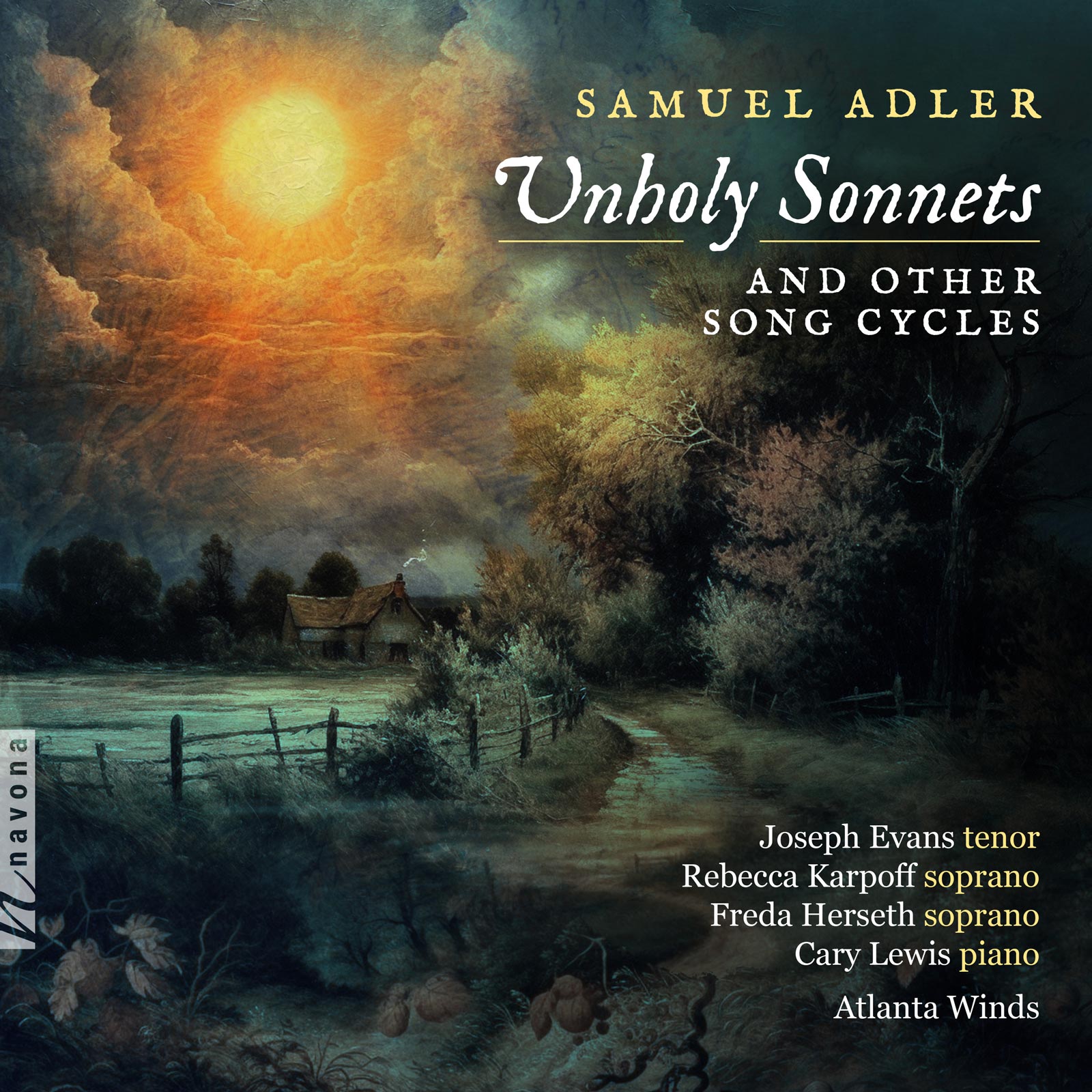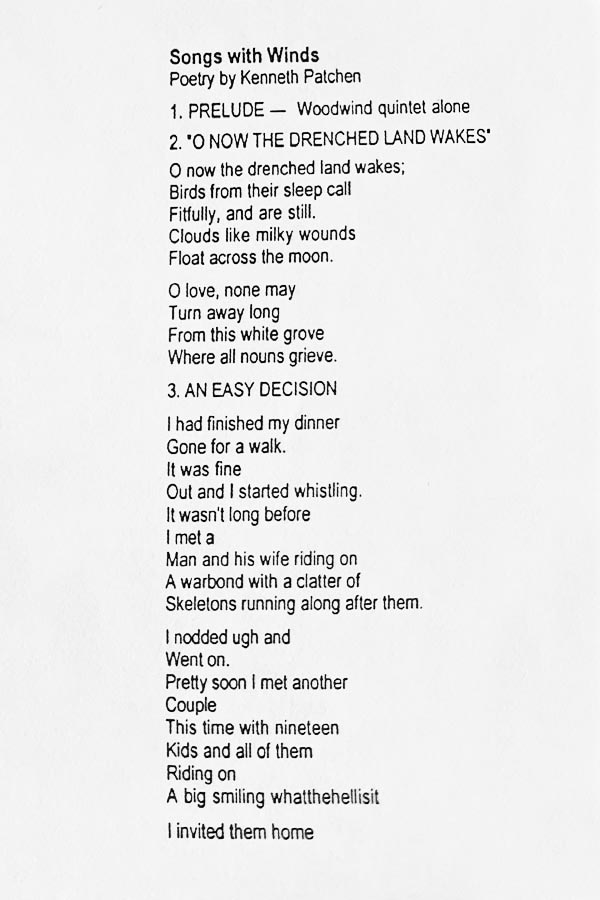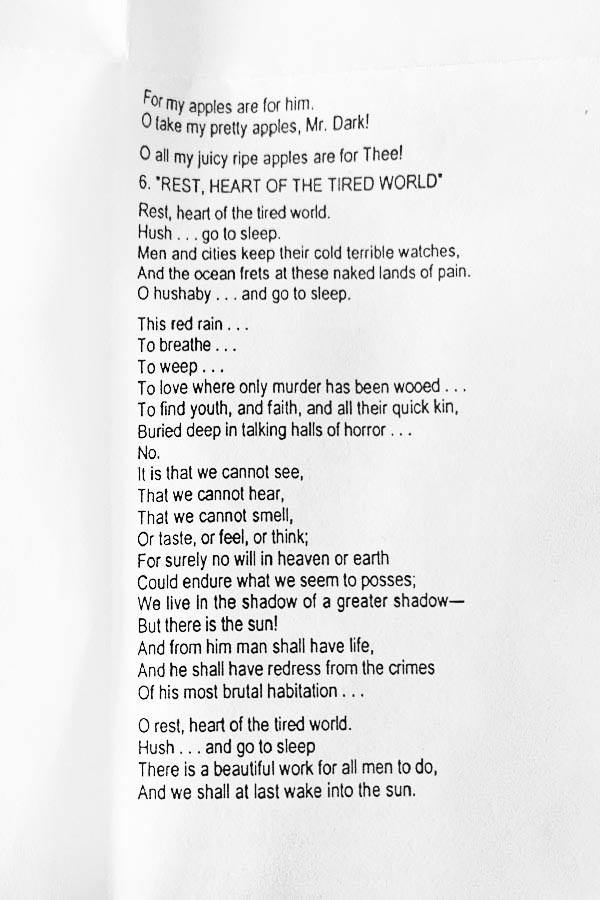Unholy Sonnets
Samuel Adler composer
Joseph Evans tenor
Rebecca Karpoff soprano
Freda Herseth soprano
Cary Lewis piano
Atlanta Winds
Few forms in classical music are as underrated as the song cycle. It is easy to be betrayed by the seemingly-modest set-up – piano and solo voice – requiring well-calculated finesse from a composer to seize its minimalist power and bring it into full bloom. UNHOLY SONNETS, a collection of songs by German-born American Samuel Adler, succeeds greatly in this effort.
Although all works presented are in English and the tonal language is decidedly modern, there is much that harks back to the German art song tradition of the 19th century. Despite the title, these are largely quiet, pensive pieces, confidently resting in a tranquil serenity.
Listen
Stream/Buy
Choose your platform
Track Listing & Credits
| # | Title | Composer | Performer | |
|---|---|---|---|---|
| 01 | Unholy Sonnets: The good-morrow | Samuel Adler | Joseph Evans, tenor; Cary Lewis, piano | 2:54 |
| 02 | Unholy Sonnets: The Broken Heart | Samuel Adler | Joseph Evans, tenor; Cary Lewis, piano | 2:41 |
| 03 | Unholy Sonnets: Woman's Constancy | Samuel Adler | Joseph Evans, tenor; Cary Lewis, piano | 4:05 |
| 04 | Unholy Sonnets: The Indifferent | Samuel Adler | Joseph Evans, tenor; Cary Lewis, piano | 1:53 |
| 05 | Unholy Sonnets: The Triple Foole | Samuel Adler | Joseph Evans, tenor; Cary Lewis, piano | 3:57 |
| 06 | Four Songs About Nature: The Wind | Samuel Adler | Rebecca Karpoff, soprano; Cary Lewis, piano | 0:47 |
| 07 | Four Songs About Nature: Chill of the Eve | Samuel Adler | Rebecca Karpoff, soprano; Cary Lewis, piano | 3:28 |
| 08 | Four Songs About Nature: The Piper | Samuel Adler | Rebecca Karpoff, soprano; Cary Lewis, piano | 2:26 |
| 09 | Four Songs About Nature: And It Was Stormy Weather | Samuel Adler | Rebecca Karpoff, soprano; Cary Lewis, piano | 1:17 |
| 10 | Three Songs About Time: But I Was Young and Foolish | Samuel Adler | Freda Herseth, soprano; Cary Lewis, piano | 1:06 |
| 11 | Three Songs About Time: Old Age | Samuel Adler | Freda Herseth, soprano; Cary Lewis, piano | 1:45 |
| 12 | Three Songs About Time: Time You Old Gypsy Man | Samuel Adler | Freda Herseth, soprano; Cary Lewis, piano | 1:45 |
| 13 | Three Songs About Love: Go Lovely Rose | Samuel Adler | Rebecca Karpoff, soprano; Cary Lewis, piano | 1:46 |
| 14 | Three Songs About Love: A Ditto | Samuel Adler | Rebecca Karpoff, soprano; Cary Lewis, piano | 1:33 |
| 15 | Three Songs About Love: Song | Samuel Adler | Rebecca Karpoff, soprano; Cary Lewis, piano | 0:44 |
| 16 | Two Songs From The Portuguese: Simple Song | Samuel Adler | Freda Herseth, soprano; Cary Lewis, piano | 0:40 |
| 17 | Two Songs From The Portuguese: Ballad | Samuel Adler | Freda Herseth, soprano; Cary Lewis, piano | 1:05 |
| 18 | Two Traditional Japanese Songs: Komori Uta (Lullaby) | Samuel Adler | Freda Herseth, soprano; Cary Lewis, piano | 1:37 |
| 19 | Two Traditional Japanese Songs: Akai Kutsu (Red Shoes) | Samuel Adler | Freda Herseth, soprano; Cary Lewis, piano | 1:43 |
| 20 | Wish For A Young Wife: Wish For A Young Wife | Samuel Adler | Joseph Evans, tenor; Cary Lewis, piano | 1:06 |
| 21 | Wish For A Young Wife: Her Words | Samuel Adler | Joseph Evans, tenor; Cary Lewis, piano | 1:34 |
| 22 | Wish For A Young Wife: Her Wrath | Samuel Adler | Joseph Evans, tenor; Cary Lewis, piano | 0:32 |
| 23 | Wish For A Young Wife: The Shy Man | Samuel Adler | Joseph Evans, tenor; Cary Lewis, piano | 4:39 |
| 24 | Wish For A Young Wife: The Moment | Samuel Adler | Joseph Evans, tenor; Cary Lewis, piano | 1:26 |
| 25 | In Thine Own Image | Samuel Adler | Freda Herseth, soprano; Cary Lewis, piano | 2:45 |
| 26 | Songs With Winds: Prelude | Samuel Adler | Rebecca Karpoff, soprano; Atlanta Winds | 1:46 |
| 27 | Songs With Winds: O Now the Drenched Land Wakes | Samuel Adler | Rebecca Karpoff, soprano; Atlanta Winds | 1:16 |
| 28 | Songs With Winds: An Easy Decision | Samuel Adler | Rebecca Karpoff, soprano; Atlanta Winds | 1:10 |
| 29 | Songs With Winds: The World | Samuel Adler | Rebecca Karpoff, soprano; Atlanta Winds | 1:44 |
| 30 | Songs With Winds: Folksong | Samuel Adler | Rebecca Karpoff, soprano; Atlanta Winds | 1:30 |
| 31 | Songs With Winds: Rest, Heart of the Tired World | Samuel Adler | Rebecca Karpoff, soprano; Atlanta Winds | 3:22 |
Session Producer & Engineer Roy Christensen
Mastering Henk Kooistra
Executive Producer Bob Lord
A&R Director Brandon MacNeil
A&R Danielle Sullivan
VP of Production Jan Košulič
Audio Director Lucas Paquette
VP, Design & Marketing Brett Picknell
Art Director Ryan Harrison
Design Edward A. Fleming
Publicity Kacie Brown
Artist Information

Samuel Adler
Samuel Adler was born March 4, 1928 in Mannheim, Germany and came to the United States in 1939. He was inducted into the American Academy of Arts and Letters in May 2001, and then inducted into the American Classical Music Hall of Fame in October 2008. In 2018 he was awarded the Bundesverdienstkreuz (first class), the highest civilian award given by the German government. He is the composer of over 400 published works, including five operas, six symphonies, 17 concerti, eight string quartets, five oratorios, and many other orchestral, band, chamber and choral works, and songs, which have been performed all over the world.
Atlanta Winds
Founded in 1991, Atlanta Winds have been hailed as “one of Atlanta’s finest young chamber ensembles.” Unfortunately this group no longer exists in the form it was constituted when the group performed on this recording. At that time it was made up of members of the Atlanta Symphony Orchestra and consisted of the following personnel: Amy Porter, flute; Yvonne Powers, oboe; Ted Gurch, clarinet; Elizabeth Burkhardt, bassoon; Richard Deane, horn. While some are still members of the orchestra, most are now in other leading positions in their field, mostly teaching in major institutions of higher learning.

















